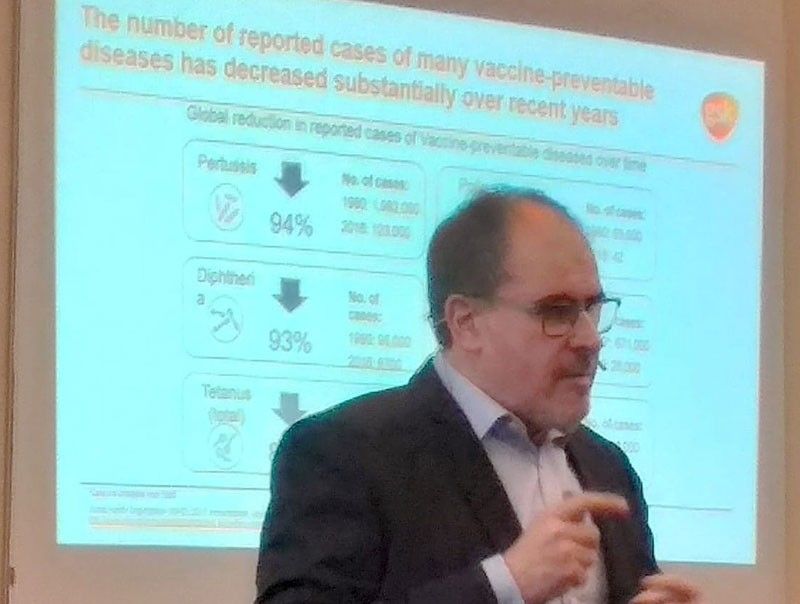Loss of confidence in vaccines ‘turns back the clock’

Dr. Otavio Cintra, head of scientific affairs and public health of GlaxoSmithKline Global Medical Affairs, speaks on the impact of vaccination as protection from life-threatening disease.
Pia Lee-Brago
WAVRE, Belgium – The loss of confidence in vaccination because of misinformation is “turning back the clock” from the gains made so far, and this has created a sense of urgency to restart after several years of establishing trust.
In the Philippines, the resurgence of polio after nearly two decades, a measles outbreak and low immunization coverage due to vaccine misinformation and hesitancy was one of the cases raised in a global vaccines media event here.
“It’s really sad to see something like this happening. They turn back the clock and you have to restart again,” Ivo Vojtek, of GSK Vaccines and Science and Global Medical Affairs, told journalists. “But the good news is that we have a lot of examples there on the roll where it did work.”
“The problem sometimes, it’s not factual. Sometimes, it’s emotional,” he said.
Vojtek cited the case of the Human Papilloma Virus (HPV) vaccines in Denmark which was one of the first countries to introduce HPV vaccination. The successful HPV vaccination program had high coverage but reports about long-term side effects became a concern and the uptake plummeted to 40 percent.
Denmark managed to recover its vaccine coverage after a survey which found out the needs and concerns of people and patients and a campaign addressing those specific needs.
“They managed to recover the vaccine coverage but it takes dedication and effort,” he said.
Education, according to Vojtek, is the key step to understanding the safety and benefits of vaccines, as well as communication and partnerships with institutions.
“This is really the key step and a lot of what we do is focusing on education,” he added.
Dr. Otavio Cintra, head of Scientific Affairs and Public Health of GlaxoSmithKline (GSK) Global Medical Affairs, said information about vaccines is more complicated now because of different platforms, like social media, through which people communicate.
“This communication about the risk and benefits, it’s a bit complicated because sometimes it’s not easy to understand, and then you’re in an emotional situation,” he said.
Cintra emphasized that vaccination is a continuous effort.
“The benefit of vaccine is not to be sick, and the benefit of medicine is to recover and be completely cured from a specific disease,” he said. “We want to prevent disease in healthy people, which is the idea of vaccine for large populations.”
In the last 20 years, Cintra witnessed the reduction in child mortality in a children’s hospital in Brazil because of an expanded vaccination program, one of the key interventions.
“We’re transparent with data we collect. The benefits clearly outweigh the side effects,” he said.
He explained that GSK monitors the safety of the vaccines it manufactures from the beginning and throughout.
According to the World Health Organization (WHO) and the United Nations Children’s Fund (UNICEF), vaccine hesitancy is driven by complacency and a lack of convenience and confidence in vaccines. The spread of vaccine misinformation has greatly contributed to decreasing public confidence in the safety and efficacy of vaccines.
“Misinformation about vaccines is as contagious and dangerous as the diseases it helps to spread,” said Dr. Tedros Adhanom Ghebreyesus, director-general of WHO, in a statement, also referring to the role social media has played in spreading vaccine misinformation.
This was echoed by UNICEF executive director Henrietta Fore, who said misinformation and growing distrust on vaccines is as “dangerous as a disease.”
She added that “vaccinations save up to three million lives every year – that’s more than five lives saved every minute.”
However, more needs to be done because “20 million children are still missing out.
---30---
SEE https://plawiuk.blogspot.com/search?q=ANTI+VAXXERS
SEE https://plawiuk.blogspot.com/search?q=VACCINATION
SEE https://plawiuk.blogspot.com/search?q=VACCINATION
No comments:
Post a Comment